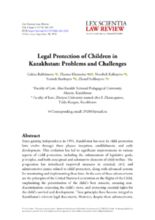Background:
Since gaining independence in 1991, Kazakhstan has seen its child protection laws evolve through three phases: inception, establishment, and early development.
This evolution has led to significant improvements in various aspects of child protection, including the enhancement of legislative goals, principles, and both conceptual and substantive clements of child welfare. The progression has introduced improved measures in criminal, civil, and administrative justice related to child protection, along with advanced systems for monitoring and implementing these laws.
At the core of these advancements are the principles of the United Nations Convention on the Rights of the Child, emphasizing the prioritization of the child's best interests, ensuring nondiscrimination, respecting the child's views, and protecting essential rights for the child's survival and development. These principles have become integral to Kazakhstan's relevant legal documents. However, despite these advancements, Kazakhstan continues to encounter challenges in the realm of legal protection for children.
Objective:
This study examined case studies highlighting specific issues or exemplary practices in child protection in Kazakhstan, providing a thorough, multidimensional analysis of child rights and protection in the country.

